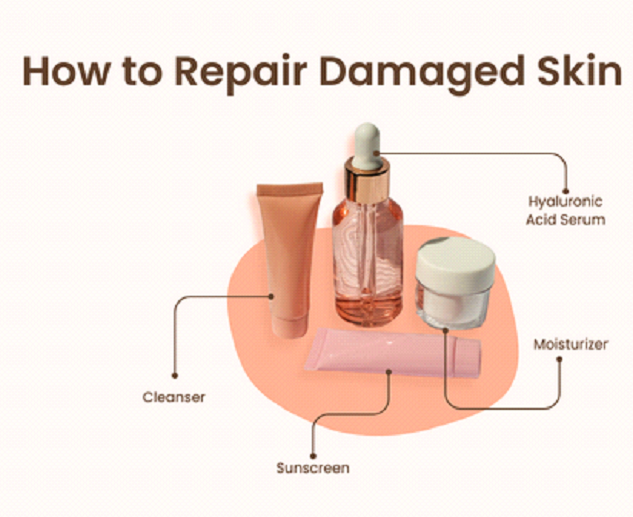
Skindripity’s shelves are stocked with items designed to hydrate and revitalize your skin. A few of them hydrate, a few plump, and some exfoliate. The skin barrier, the body’s topmost layer, is what all these products treat.
Although the skin barrier acts like a body’s barrier of protection, harm to it may leave an effect on the health and general wellbeing of your skin. if this barrier gets damaged, various skin problems can arise. Restoring healthy, radiant skin needs an awareness of how to detect damage and treat it.
We’ll address these concerns in this blog post, and offer steps you may take to protect and replenish this essential barrier.
What is the skin barrier and why does it matter?
Skin’s initial line of protection, the stratum corneum, which is the topmost layer of the skin, is known as the skin barrier. It forms a wall that protects against bacteria, toxins, pollution, and other toxic substances. It is composed of tightly packed skin cells bound by lipids. In the case a such barrier malfunctions, water might easily leak out, causing dry skin and damaged healthy skin.
Once the skin barrier is damaged, it makes your skin more prone to outer stresses. Skin that was once smooth, supple, radiant, and plump may turn rough, dry, red, and irritated very fast. This is because essential components that maintain the health and hydration of your skin, such as cholesterol, fatty acids, and ceramides, are lost by a damaged barrier. Not only does it irritate skin, but it can also give a look of tired, dead skin that can be more at risk for aging and flaws.
The Best Way to Find a Damaged Skin Barrier
It’s possible that the skin’s barrier has been damaged if you’re having skin problems. If using skincare products causes your skin to feel tight, dry, flaky, or to burn. Frequent acne, itching, rough texture, and signs of eczema or rosacea are some other warning signs. All these imply that you need to revive your skin barrier.
Common factors that damage skin barrier are:
⦁ An excessively moist or dry atmosphere
⦁ Allergens and pollutants
⦁ Sun exposure
⦁ Alkaline detergents, cleansers, and soap
⦁ Risky chemicals
⦁ Excessive skin cleansing
⦁ Anxiety
⦁ Some drugs, such as steroids
Dos and Don’ts for Repairing a Damaged Skin Barrier
It’s better to prevent than to treat when it comes to keeping the barrier of your skin. To avert damage and maintain the health of yours, follow some of the advice:
⦁ Apply a gentle cleanser. Strong cleansers have the ability to remove essential nutrients and moisture that maintain the health of your skin barrier.
⦁ Use lukewarm water constantly. Too hot or too cold water may lead to skin irritation.
⦁ Use skincare products without fragrances. Fragrance, which includes essential oils, may strip skin of the nutrients it needs to keep healthy and make it more sensitive.
⦁ Avoid using harsh scrubs since they can rip tiny holes in the skin’s surface. Use a mild, leave-on cleanser in its place.
⦁ Always protect your skin from the sun. One of the main reasons for a compromised skin barrier is sun exposure. Use a sunscreen with an SPF of 30 or more which is high in anti-oxidants.
⦁ Strong chemicals like retinol, AHA, BHA, and acne treatments should not be overused since they might irritate your skin. For the best results with no irritation, use products at different times of the day (e.g., retinol at night and cleanser in the morning). Also, be sure to stick to the right amount and frequency for your skin.
Tips to Keep Your Skin Barrier Strong and Healthy
⦁ Use moisturizing, fragrance-free products that are mild and adapt your skincare routine to the skin’s evolving requirements so as to preserve a healthy skin barrier.
⦁ Reintroducing active components, such as retinol, should be done gently and one at a time. If essential, use milder solutions like Bakuchiol or PHAs.
⦁ Steer clear of potential damage-causing triggers and maintain an easy, steady routine.
⦁ Take anything off your skin if it annoys it.
⦁ Maintaining a strong skin barrier is a prerequisite for protecting your body and skin.
How long a time does it need for the skin barrier to repair?
It takes time and effort to repair a damaged skin barrier; it is not a quick relief. The level of damage and the condition of the skin will affect how long it takes for you to heal. Within a few days, you could start to see some changes; in a few weeks, you may notice improved results. In two to three months, optimal skin health is often attained, while severe harm can take longer.
Prior to slowly introducing new products, rejuvenate your skin by sticking to an essential skincare routine. Your skin may experience a “worse-before-better” duration; be calm. With time, skin that gets ongoing care will get softer, smoother, and healthier.
Final Thought
In conclusion, restoring your skin barrier is an effort that calls for patience and regular maintenance. To prevent irritation, start with a mild, moisturizing regimen and add another products bit by bit. As you shield your skin from outdoor irritants, concentrate on using gentle, fragrance-free treatments.
Though reaching ideal skin health might take weeks or months, changes may be noticeable within days. Remain grounded, pay attention to your skin, and show patience when things don’t go as planned. Smoother, softer, and healthier skin will soon be yours, and your barrier will get better than ever, if you take the right steps.
How to Repair Your Skin Barrier: Expert Tips for Healthier Skin
Skindripity’s shelves are stocked with items designed to hydrate and revitalize your skin. A few of them hydrate, a few plump, and some exfoliate. The skin barrier, the body’s topmost layer, is what all these products treat.
Although the skin barrier acts like a body’s barrier of protection, harm to it may leave an effect on the health and general wellbeing of your skin. if this barrier gets damaged, various skin problems can arise. Restoring healthy, radiant skin needs an awareness of how to detect damage and treat it.
We’ll address these concerns in this blog post, and offer steps you may take to protect and replenish this essential barrier.
What is the skin barrier and why does it matter?
Skin’s initial line of protection, the stratum corneum, which is the topmost layer of the skin, is known as the skin barrier. It forms a wall that protects against bacteria, toxins, pollution, and other toxic substances. It is composed of tightly packed skin cells bound by lipids. In the case a such barrier malfunctions, water might easily leak out, causing dry skin and damaged healthy skin.
Once the skin barrier is damaged, it makes your skin more prone to outer stresses. Skin that was once smooth, supple, radiant, and plump may turn rough, dry, red, and irritated very fast. This is because essential components that maintain the health and hydration of your skin, such as cholesterol, fatty acids, and ceramides, are lost by a damaged barrier. Not only does it irritate skin, but it can also give a look of tired, dead skin that can be more at risk for aging and flaws.
The Best Way to Find a Damaged Skin Barrier
It’s possible that the skin’s barrier has been damaged if you’re having skin problems. If using skincare products causes your skin to feel tight, dry, flaky, or to burn. Frequent acne, itching, rough texture, and signs of eczema or rosacea are some other warning signs. All these imply that you need to revive your skin barrier.
Common factors that damage skin barrier are:
⦁ An excessively moist or dry atmosphere
⦁ Allergens and pollutants
⦁ Sun exposure
⦁ Alkaline detergents, cleansers, and soap
⦁ Risky chemicals
⦁ Excessive skin cleansing
⦁ Anxiety
⦁ Some drugs, such as steroids
Dos and Don’ts for Repairing a Damaged Skin Barrier
It’s better to prevent than to treat when it comes to keeping the barrier of your skin. To avert damage and maintain the health of yours, follow some of the advice:
⦁ Apply a gentle cleanser. Strong cleansers have the ability to remove essential nutrients and moisture that maintain the health of your skin barrier.
⦁ Use lukewarm water constantly. Too hot or too cold water may lead to skin irritation.
⦁ Use skincare products without fragrances. Fragrance, which includes essential oils, may strip skin of the nutrients it needs to keep healthy and make it more sensitive.
⦁ Avoid using harsh scrubs since they can rip tiny holes in the skin’s surface. Use a mild, leave-on cleanser in its place.
⦁ Always protect your skin from the sun. One of the main reasons for a compromised skin barrier is sun exposure. Use a sunscreen with an SPF of 30 or more which is high in anti-oxidants.
⦁ Strong chemicals like retinol, AHA, BHA, and acne treatments should not be overused since they might irritate your skin. For the best results with no irritation, use products at different times of the day (e.g., retinol at night and cleanser in the morning). Also, be sure to stick to the right amount and frequency for your skin.
Tips to Keep Your Skin Barrier Strong and Healthy
⦁ Use moisturizing, fragrance-free products that are mild and adapt your skincare routine to the skin’s evolving requirements so as to preserve a healthy skin barrier.
⦁ Reintroducing active components, such as retinol, should be done gently and one at a time. If essential, use milder solutions like Bakuchiol or PHAs.
⦁ Steer clear of potential damage-causing triggers and maintain an easy, steady routine.
⦁ Take anything off your skin if it annoys it.
⦁ Maintaining a strong skin barrier is a prerequisite for protecting your body and skin.

How long a time does it need for the skin barrier to repair?
It takes time and effort to repair a damaged skin barrier; it is not a quick relief. The level of damage and the condition of the skin will affect how long it takes for you to heal. Within a few days, you could start to see some changes; in a few weeks, you may notice improved results. In two to three months, optimal skin health is often attained, while severe harm can take longer.
Prior to slowly introducing new products, rejuvenate your skin by sticking to an essential skincare routine. Your skin may experience a “worse-before-better” duration; be calm. With time, skin that gets ongoing care will get softer, smoother, and healthier.
Final Thought
In conclusion, restoring your skin barrier is an effort that calls for patience and regular maintenance. To prevent irritation, start with a mild, moisturizing regimen and add another products bit by bit. As you shield your skin from outdoor irritants, concentrate on using gentle, fragrance-free treatments.
Though reaching ideal skin health might take weeks or months, changes may be noticeable within days. Remain grounded, pay attention to your skin, and show patience when things don’t go as planned. Smoother, softer, and healthier skin will soon be yours, and your barrier will get better than ever, if you take the right steps

